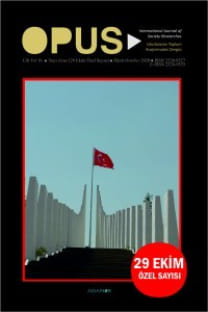Duygusal Zekânın Arkadaşlık Kalitesine Etkisinin Farklı Değişkenler Açısından İncelenmesi
Duygusal Zekâ, Arkadaşlık Kalitesi, ANOVA, Bağımsız Örneklem t testi
Evaluation of the Effect of Emotional Intelligence on Friendship Quality in Terms of Different Variables
___
- Akın, A., & Akın, Ü. (2015). Friendship quality and subjective happi-ness: The mediator role of subjective vitality. Education & Science, 40(177), 233-242.
- Akın, A., Karduz Adam, F. F., & Akın, Ü. (2014). Arkadaşlık kalitesi ölçeği Türkçe formunun geçerlik ve güvenirliği. Journal of Research in Education and Teaching, 3(4), 378-383.
- Bar-On, R. (1997). BarOn emotional quotient inventory. Toronto: Multi-Health Systems. Ciarrochi, J. V., Chan, A. Y., & Caputi, P. (2000). A critical evaluation of the emotional intelligence construct. Personality and Individual Differences, 28(3), 539-561.
- Ciarrochi, J., Chan, A. Y., & Bajgar, J. (2001). Measuring emotional in-telligence in adolescents. Personality and Individual Differences, 31(7), 1105-1119.
- Cooper, R., & Sawaf, A. (2003). Liderlikte duygusal zekâ [emotional intelligence in leadership]. Istanbul, Turkey: Sistem Press.
- Ergin, D. Y., E. Işmen, and N. Özabacı. (1999). EQ of gifted youths: A comparative study. 13th Biennial World Conference, World Council for Gifted and Talented Children, Istanbul.
- Ergin, E.F., (2000). Üniversite öğrencilerinin sahip oldukları duygusal zeka düzeyi ile 16 kişilik özelliği arasındaki ilişki üzerine bir araştırma. (Unpublished master’s thesis), Selçuk University, Institute of Social Sciences, Konya.
- Erginsoy, D. (2002). Duygusal zeka ve kişilerarası iiişkiler tarzları arasındaki ilişkinin incelenmesi. (Unpublished master’s thesis), Atatürk University, Institute of Social Sciences, Erzurum.
- Fernandez-Berrocal, P., Alcaide, R., Extremera, N., & Pizarro, D. (2006). The role of emotional intelligence in anxiety and depression among adolescents. Individual Differences Research, 4(1), 16-27.
- Girgin, G. (2009). Üniversite öğrencilerinde duygusal zekanın bazı değişkenler açısından incelenmesi. TRNC - National Journal of Education, 3, 1-12.
- Goleman, D.P. (1995). Emotional intelligence: Why it can matter more than iq for character, health and lifelong achievement, Bantam Books, New York.
- Kandel, D. B. (1978). Homophily, Selection, and Socialization in Adolescent Friendships. American Journal of Sociology, 84(2), 427-436.
- Kharimah, U. N., Prasetyawati, W., & Sary, M. P. (2018). Association between friendship quality and depression among high school students in jakarta. Advances in Social Science, Education and Hu-manities Research, 139, 28-33. doi:10.2991/uipsur-17.2018.5
- Kırtıl, S.(2009). İlköğretim ikinci kademe öğrencilerinin duygusal zeka düzeyleri ile yaşam doyumu düzeylerinin incelenmesi. (Unpublished master’s thesis). Dokuz Eylül University, Institute of Educa-tional Sciences, İzmir.
- Köksal, A. & İşmen Gazioğlu, A. E. (2007). Ergenlerde duygusal zekâ ile karar verme stratejileri arasındaki ilişki. HAYEF: Journal of Education, 4(1), 133-146
- Lin, C. W. (2018). Structural modeling on the relationship between pos-itive perception, deliberative belief, and friendship quality: A study with undergraduate students. Education, 138(3), 279-289.
- Locke, E. A. (2005). Why emotional intelligence is an invalid concept. Journal of organizational Behavior, 26(4), 425-431.
- Nas, F. (2017). Üniversite öğrencilerinin arkadaşlık seçiminde cinsiyet, inanç ve etnisite değişkenlerinin önemi (Bartın Üniversitesi Örneği). Ordu University Journal of Social Science Research, 7(3), 489-497.
- Salovey, P., & Mayer, J. D. (1990). Emotional intelligence. Imagination, Cognition and Personality, 9(3), 185-211. Schutte N. S., Malouff J. M., Bobık C. And Others, (2001). Emotional intelligence and interpersonal relations. The Journal of Social Psychology, 141(4), 523-536.
- Taşlıyan, M., Hırlak, B., & Harbalıoğlu, M. (2015). Duygusal zekâ, iletişim becerileri ve akademik başarı arasındaki ilişki: Üniversite öğrencilerine bir uygulama. ASSAM International Refereed Journal, 2(3), 45-58.
- Thien, L. M., Razak, N. A., & Jamil, H. (2012). Friendship quality scale: Conceptualization, development and validation. Joint AARE APERA International Conference, Sydney, 1-14.
- Tsaousis, I., & Nikolaou, I. (2005). Exploring the relationship of emotional intelligence with physical and psychological health functioning. Stress and Health: Journal of the International Society for the Investigation of Stress, 21(2), 77-86.
- Üncü, S. (2007). Duygusal zeka ve evlilik doyumu ilişkisi. (Unpublished master’s thesis), Ankara University, Institute of Educational Sciences, Ankara
- ISSN: 2528-9527
- Yayın Aralığı: 12
- Yayıncı: ADAMOR Toplum Araştırmaları Merkezi
Akıllı Telefonların Gençlerin Gündelik Hayatlarına Etkisi: Türkiye’de Üniversite Gençliği Örneği
Türkiye’de Yenilenebilir Enerji Tüketiminin İthalat Üzerindeki Etkisi
Erken Ergenlikte Şiddete Yönelik Tutumun Belirleyicisi Olarak Heyecan Arayışı ve Kendini Gizleme
Mehmet KAYA, Ümit SAHRANÇ, Eyüp ÇELİK
Dijital Dönüşüm Çağında Sürdürülebilir Turizmin Gelişimi
Piotr Zienarski, Małgorzata SUCH-PYRGİEL
Kolaylaştırıcı Okul Yapısı ve Örgütsel Vatandaşlık Davranışları Arasındaki İlişkinin İncelenmesi
Cumhuriyet Dönemi Kadın Dergileri (1923-1992)
Selda MALKOÇ KILIÇ, Duygu VEFİKULUÇAY YILMAZ
Tuba BÜYÜKBEŞE, Sinan ÇAVUŞOĞLU, Olcay OKUN
Duygusal Zekânın Arkadaşlık Kalitesine Etkisinin Farklı Değişkenler Açısından İncelenmesi
